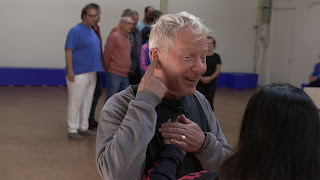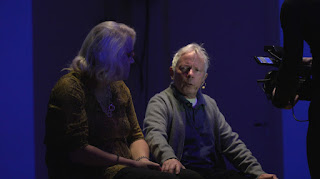When you hear the name Paul Röttger, there's a good chance that you might think of his starring role in the TV adaptation of Jan Terlouw's Oorlogswinter, a series that was first broadcast all the way back in 1975 on what was then known as Nederland 1 (now NPO 1). A few years later, Röttger was seen on the big screen in another tale of the Netherlands under German occupation, Wim Verstappen's Pastorale 1943. The part of Michiel van Beusekom in Oorlogswinter might quite reasonably be viewed as Röttger's defining screen role, although he also played the title character in Simon Winner and appeared in the Dutch version of classic British sitcom Porridge. Yet for the past three decades or so, Röttger has been more or less exclusively focused on theatre; his pioneering efforts with the Rotterdams Centrum voor Theater (RCTh) have rightly earned numerous plaudits for the actor–director, who also founded the institution.
What sets Röttger's work with the RCTh apart is that, at its core, it's all about inclusivity, and his company Theater Babel Rotterdam consists of performers from all walks of life—race, gender, sexuality, physical ability, or mental condition form no obstacle for those who'd like to work in one of Röttger's productions. There's no gimmick here—Röttger has complete belief in this project, and he has worked tirelessly to carve out a space for people who are shunned by so many; this fine film from Christiaan van Schermbeek captures the sincerity of a man who has devoted himself to providing opportunities for anyone and everyone who harbours the desire to work in theatre. Van Schermbeek is no stranger to the International Film Festival Rotterdam, where Altijd alles anders is currently premiering in the RTM strand, and over the past twenty years a number of his medium-length works—most notably the Simply Cinema series of films—have played at the festival.
While Altijd alles anders generally takes a holistic view of the work of Theater Babel Rotterdam, it does spend some time on individual interviews with a number of the company's members beyond Paul Röttger, and such segments frequently prove to be both illuminating and moving. One of the film's most touching moments comes fairly early on, when Stijn, a likeable young man with a real talent for drumming, rues the day when he came close to joining a band. The reasons it didn't work out had nothing to do with his musical ability, and Stijn says that he doesn't consider it to be a missed opportunity; rather, he views the way he is as being the real missed opportunity. There's something quite heartbreaking about the highly perceptive Stijn's candour, yet he's a great example of the sort of individual who, without the exceptional tutelage of Paul Röttger, would most likely have spent much if not all of their life on the margins of society.
As a documentary, Altijd alles anders is something of a no-frills affair, with van Schermbeek opting for a pragmatic approach as he gets up close and personal with both Röttger and the actors he's guiding; it's fascinating to watch the company's rehearsals from the vantage point of a camera that's quite literally among the actors, and such a bold move captures both the immediacy and energy of the group in a way that could never be matched by the fly on the wall technique. What if any difference this strategy might make to the performers is impossible to gauge, but you sense that van Schermbeek is just as well to jump right in like this; after all, as the great ethnographic filmmaker Jean Rouch once pointed out, subjects will always be affected by the presence of a camera. In a way, Christiaan van Scheermbeek's approach mirrors that of Röttger's: both men are keen to roll up their sleeves and cut directly to the heart of the matter. Altijd alles anders is both a fine record of Paul Röttger's work with RCTh and a deceptively simple film; it contains moments that stay with the viewer for a long time after the end credits have rolled.
Darren Arnold
Images: IFFR





